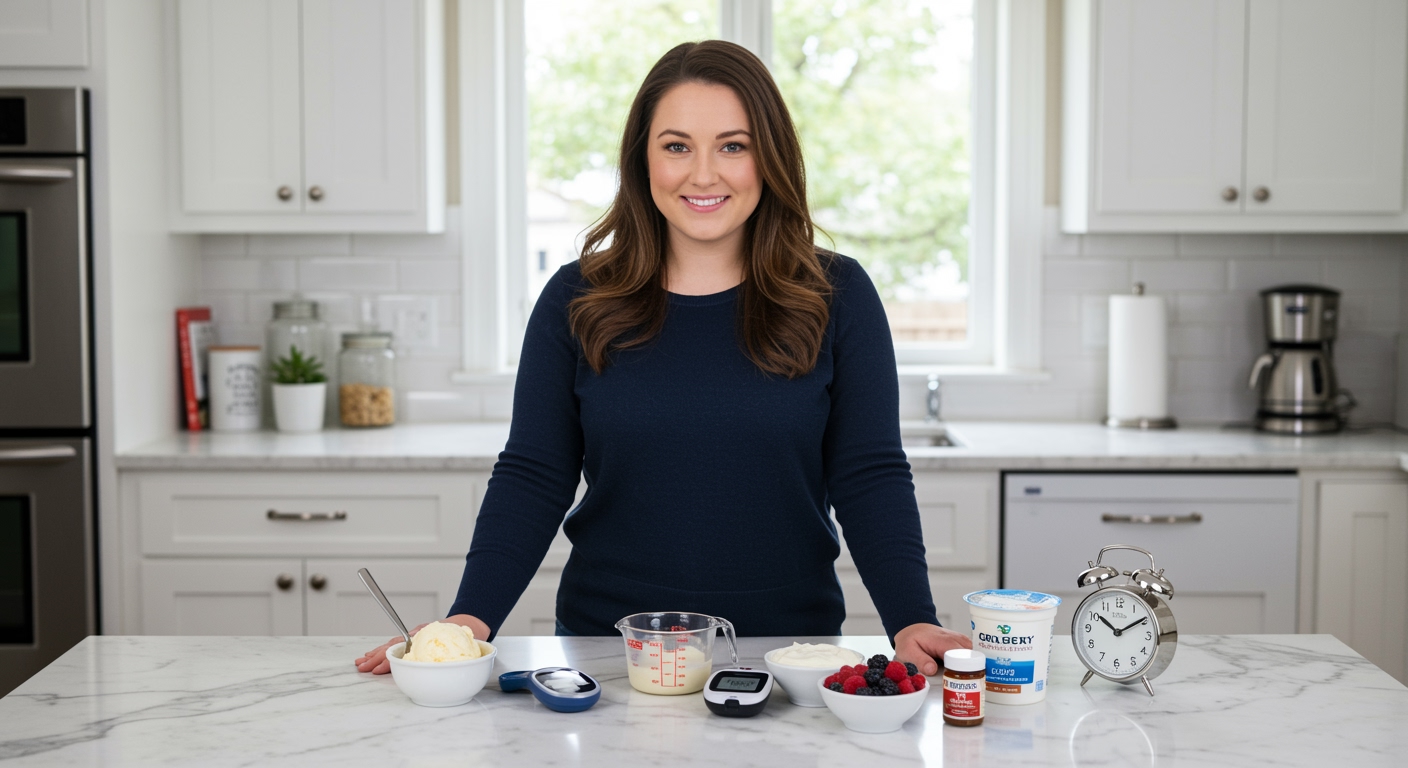✪ Key Takeaway: Cream is not inherently bad for PCOS when consumed in moderation as part of a balanced diet.
Introduction
You open your fridge and stare at that container of heavy cream, wondering if it will make your PCOS symptoms worse.
This confusion happens because conflicting advice about dairy and PCOS floods the internet, leaving you uncertain about what foods actually help or harm your condition.
Hi, I’m Abdur, your nutrition coach, and today I’m going to explain the real relationship between cream and PCOS so you can make informed decisions about your diet.
What Makes Cream Different From Other Dairy?
Heavy cream contains 36-40% fat with minimal carbohydrates and protein compared to milk.
This high fat content means cream has a lower insulin response than milk or yogurt because fat does not spike blood sugar levels.
The lactose content in cream is significantly reduced during the separation process, making it easier to digest for many people.
Most commercial creams contain fewer inflammatory proteins like casein compared to whole milk products.
This unique composition makes cream behave differently in your body than other dairy products you might have been told to avoid.
Understanding these differences helps explain why cream might not trigger the same PCOS symptoms as milk or ice cream.
✪ Fact: Heavy cream contains 80% less lactose than whole milk, making it more tolerable for sensitive individuals.
How Does Cream Affect Insulin Resistance?
Insulin resistance is the core issue in PCOS, and cream’s impact depends entirely on how you use it.
Pure heavy cream has a glycemic index of zero, meaning it does not raise blood sugar when consumed alone.
The high fat content actually slows glucose absorption when combined with other foods, potentially improving blood sugar control.
However, adding cream to sugary coffee drinks or desserts creates a different metabolic response that can worsen insulin resistance.
Research shows that saturated fats from dairy can either help or harm insulin sensitivity depending on the overall dietary pattern.
Women with PCOS who follow low-carb diets often see improvements in insulin sensitivity when including moderate amounts of cream.
The key lies in using cream as part of a nutrient-dense meal rather than in processed foods or sugary beverages.
✪ Pro Tip: Add cream to your morning coffee instead of sugar to avoid blood sugar spikes while enjoying a satisfying drink.
Can Cream Trigger Hormonal Imbalances?
The relationship between cream and hormonal balance in PCOS is more complex than most people realize.
Dairy proteins can stimulate insulin-like growth factor (IGF-1), which may increase androgen production in some women.
However, cream contains significantly fewer of these problematic proteins compared to milk or cheese.
Some women with PCOS report that eliminating all dairy improves their acne and hair growth, while others see no difference.
The individual response varies greatly, and genetic factors play a significant role in how your body processes dairy products.
Quality matters tremendously – cream from grass-fed cows contains higher levels of anti-inflammatory compounds like omega-3 fatty acids.
Many nutrition experts suggest trying an elimination diet to determine your personal tolerance rather than avoiding cream based on general recommendations.
✪ Note: Keep a food diary for 30 days to track how cream affects your PCOS symptoms personally.
What About Topical Progesterone Cream?
Progesterone cream represents a completely different category from dietary cream and serves as a therapeutic option for PCOS.
Many women with PCOS have low progesterone levels due to irregular ovulation and hormonal imbalances.
Topical progesterone cream can help balance estrogen dominance and reduce symptoms like irregular periods and mood swings.
This bioidentical hormone therapy works by absorbing through the skin and entering the bloodstream directly.
Clinical studies show that progesterone supplementation can improve insulin sensitivity and reduce inflammation in women with PCOS.
However, you should only use progesterone cream under medical supervision after proper hormone testing.
The timing and dosage must be carefully calibrated to your individual hormone levels and menstrual cycle patterns.
✪ Pro Tip: Always consult with a healthcare provider before starting any hormone therapy, including progesterone cream.
How Should You Include Cream In Your PCOS Diet?
Smart inclusion of cream in your PCOS diet focuses on quality, timing, and moderation.
Choose organic, grass-fed cream whenever possible to minimize exposure to hormones and maximize beneficial nutrients.
Use cream in savory dishes like soups, sauces, and vegetable preparations rather than sweet desserts.
Limit portions to 1-2 tablespoons per day to avoid excessive calorie intake that could worsen insulin resistance.
Pair cream with fiber-rich vegetables and lean proteins to create balanced meals that support stable blood sugar.
Avoid cream in processed foods and commercial products that often contain added sugars and inflammatory ingredients.
Monitor your body’s response for 2-4 weeks and adjust your intake based on how you feel and any changes in PCOS symptoms.
✪ Fact: Grass-fed cream contains 5 times more conjugated linoleic acid (CLA) than conventional cream, which may help reduce inflammation.
The Bottom Line
Cream is not inherently bad for PCOS when used thoughtfully as part of a balanced, whole-foods diet.
Your individual response matters more than general dietary rules, so pay attention to how your body reacts rather than following blanket restrictions.
I would love to hear about your experience with dairy and PCOS – please share your questions, success stories, or concerns in the comments below so we can learn from each other.
References
At NutritionCrown, we use quality and credible sources to ensure our content is accurate and trustworthy. Below are the sources referenced in writing this article:
- Harvard Health: Polycystic ovarian syndrome and the skin
- Integrative MGI: Sense Woman PCOS Progesterone Cream
- Cleveland Clinic: Polycystic Ovary Syndrome (PCOS)
- NHS: Polycystic ovary syndrome (PCOS) – Treatment





